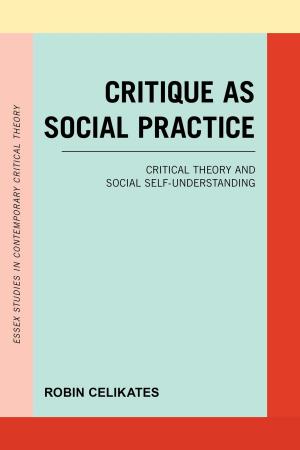The Labour of Subjectivity
Foucault on Biopolitics, Economy, Critique
Nonfiction, Social & Cultural Studies, Political Science, Politics, Economic Conditions, Religion & Spirituality, Philosophy, Political| Author: | Andrea Rossi | ISBN: | 9781783486021 |
| Publisher: | Rowman & Littlefield International | Publication: | November 30, 2015 |
| Imprint: | Rowman & Littlefield International | Language: | English |
| Author: | Andrea Rossi |
| ISBN: | 9781783486021 |
| Publisher: | Rowman & Littlefield International |
| Publication: | November 30, 2015 |
| Imprint: | Rowman & Littlefield International |
| Language: | English |
Michel Foucault defined critique as an exercise in de-subjectivation. To what extent did this claim shape his philosophical practice? What are its theoretical and ethical justifications? Why did Foucault come to view the production of subjectivity as a key site of political and intellectual emancipation in the present?
Andrea Rossi pursues these questions in The Labour of Subjectivity. The book re-examines the genealogy of the politics of subjectivity that Foucault began to outline in his lectures at the Collège de France in the late 1970s and early 1980s. He explores Christian confession, raison d’état, biopolitics and bioeconomy as the different technologies by which Western politics has attempted to produce, regulate and give form to the subjectivity of its subjects. Ultimately Rossi argues that Foucault’s critical project can only be comprehended within the context of this historico-political trajectory, as an attempt to give the extant politics of the self a new horizon.
Michel Foucault defined critique as an exercise in de-subjectivation. To what extent did this claim shape his philosophical practice? What are its theoretical and ethical justifications? Why did Foucault come to view the production of subjectivity as a key site of political and intellectual emancipation in the present?
Andrea Rossi pursues these questions in The Labour of Subjectivity. The book re-examines the genealogy of the politics of subjectivity that Foucault began to outline in his lectures at the Collège de France in the late 1970s and early 1980s. He explores Christian confession, raison d’état, biopolitics and bioeconomy as the different technologies by which Western politics has attempted to produce, regulate and give form to the subjectivity of its subjects. Ultimately Rossi argues that Foucault’s critical project can only be comprehended within the context of this historico-political trajectory, as an attempt to give the extant politics of the self a new horizon.















